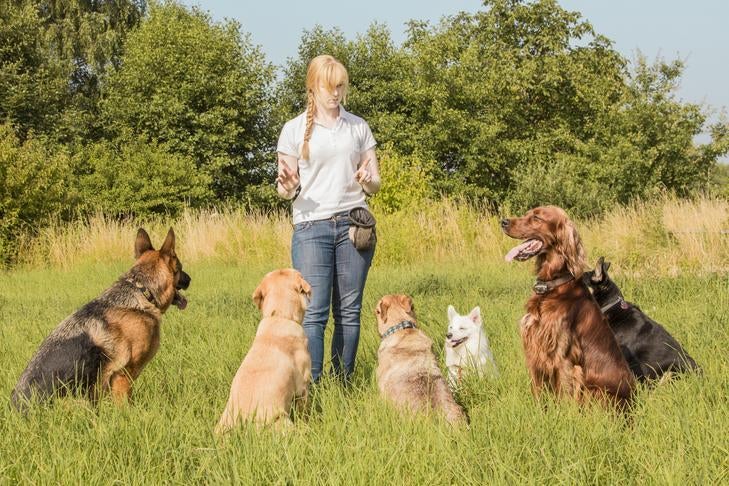When an American Hairless Terrier stands next to a Newfoundland, the physical differences between the breeds are obvious. It’s hard to believe that all the many shapes and sizes of dogs are members of a single species (Canis familiaris). But when you compare the genetic makeup of different dog breeds, they are actually very similar. So why do cognitive traits vary by breed?
Some dogs are more sociable, better problem solvers, or easier to train than others, but why? To a certain extent, knowing the breed of a dog and understanding the traditional traits of that breed can help predict the dog’s personality and potential.
For example, are Border Collies good at understanding a handler’s signals only because they were trained to do so? Or do they have a genetic predisposition that makes them more likely to understand human cues than another breed?A study by researchers from the University of Helsinki and other institutions in Finland focused on the cognitive differences in dog breeds and whether there is a genetic link to these differences.
How Breeds Were Tested for Cognitive Abilities
The analysis was drawn from a sample of 1,002 dogs representing 13 dog breeds. The canine subjects took a battery of cognitive tests developed by researcher Katriina Tiira and conducted by SmartDOG between 2016 and 2022. Participating dogs had to be food-motivated and not very aggressive to people.
The dogs were between 1 and 8 years old, while at least 40 members of each breed studied were tested. Most were privately owned companion dogs. Information about the training, background, and life experiences of the dogs was not available.

The researchers analyzed the data and identified differences in specific cognitive traits of the following breeds — the Golden Retriever, Hovawart, English Cocker Spaniel, German Shepherd Dog, Labrador Retriever, Australian Shepherd, Finnish Lapphund, Border Collie, Australian Kelpie, Belgian Malinois, Spanish Water Dog, Shetland Sheepdog, and a category of mixed-breed dogs.
The dogs took a series of ten tests that measured seven cognitive traits and three behaviors. All the tests involved solving problems to obtain a food reward. The owner was present for each test, and the dog was off-lead.
These tests measured response to a friendly stranger, the dog’s activity levels, willingness to investigate a new environment, persistence, inhibitory control (controlling impulses and urges), understanding of human gestures, problem-solving abilities, social cognition (how you process, understand, and also respond to signals related to social groups), logical reasoning, and short-term memory.
Cognition Varies Breed by Breed
Data analysis revealed differences between dog breeds regarding social cognition, persistence, inhibitory control, and spatial problem-solving ability. There were also breed differences in the measures of activity level, willingness to greet a stranger, and enthusiasm for exploring a new environment. Measurements of short-term memory and logical reasoning did not differ from breed to breed.

The cognitive differences observed in certain breeds are important because these are some of the traits most valued for working dogs and companion dogs. For example:
- Border Collies and Australian Shepherds scored highest in the test for inhibitory control. Herding breeds like these are required to control their predatory response to other animals.
- Belgian Malinois and German Shepherds proved to have low inhibitory control and were most likely to be completely independent when solving a task (rather than waiting for human direction). When these breeds perform in police and military environments, they must be ready to respond immediately and work independently.
- In contrast, breeds that score high in taking direction from humans and display socio-cognitive abilities may make good companion dogs and be more successful doing jobs that require working closely with a handler. The Australian Kelpie, Australian Shepherd, Border Collie, and Golden Retriever focused the most on human-directed behavior during the unsolvable task test.
- Researchers also observed that specific breeds display substantially different traits from other breeds within their group or those that serve similar functions. The Belgian Malinois and Finnish Lapphund are part of the Herding Group, while the Australian Kelpie is a skilled herding breed that’s enrolled in the Foundation Stock Service (FSS). In the study, the Australian Kelpie and Belgian Malinois were highly attuned to human gestures, while the Finnish Lapphund was not. Similarly, for the unsolvable task test, the Australian Shepherd was least likely to give up, while the Kelpie was most likely to abandon the task. In two of the tests — understanding a human gesture and getting help with an unsolvable task — Golden Retrievers and Labrador Retrievers scored very differently, despite both being part of the Sporting Group.
Traits Are Often Breed-Specific

As a result of the study, the researchers concluded that there are significant differences in behavioral and cognitive traits in individual dog breeds. Other studies have investigated the genetic evolution of dogs and the resulting impact of breed traits, yielding fascinating findings. A 2019 study found that behavioral traits that may be inherited include trainability, stranger-directed aggression, chasing, attachment, and attention-seeking.
Male and female dogs also show differences in personality traits, cognitive processes, and perception. These are similar to the sex differences in wild animals and are rooted in their biological and evolutionary heritage.

